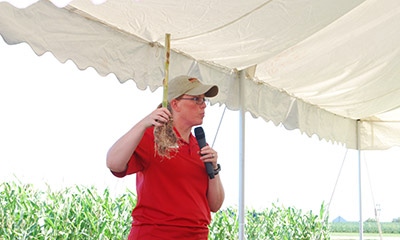
Iowa State University Extension farm management field specialist Shane Ellis and Mary Ebert, program coordinator for ISU Extension in Guthrie County, launched a pilot series of educational meetings a few weeks ago, called Women Managing Crops. It's similar to Annie's Project but is focused on agronomy concepts and grain marketing.

MORE WOMEN FARMING: Women own 47% of Iowa farmland, and whether these landowners farm the land themselves or lease out their land to other farmers, they are taking on increasing managerial roles. Other women are not landowners, but find themselves taking on many crop production roles.
"I had the pleasure of working with the group the first two weeks on soils, fertility and pest management and scouting," says Clarke McGrath, ISU Extension field agronomist based at Harlan, in western Iowa. "It was simply awesome! The group was enthusiastic, had great experiences and insight to share and asked great questions. It sounds like more counties in our Extension area are interested in hosting future sessions, I'd certainly be willing to help."
If you are interested in helping a similar program get started in your county, talk with Shane or Mary with questions about the classes in general, advises McGrath. You can contact them at Guthrie County Extension at 641-747-2276. McGrath authors an agronomy column every month in Wallaces Farmer magazine.
Women in rural Iowa becoming more involved in crop production
"Women own 47% of Iowa farmland, and whether these landowners farm the land themselves or lease out their land to other farmers, they are taking on increasing managerial roles," notes Ellis. "Other women are not landowners, but find themselves taking on many crop production roles. Still other women in rural Iowa just want to learn more about typical agronomic production and Iowa's soil and water."
Here's how the Guthrie County program was designed and carried out in November: "Women Managing Crops" was a three-session course designed for women of all ages and experience levels who want to know more about key decisions for corn and soybean production. The sessions take a seasonal approach and cover decision-making for pre-planting in week one, the growing phase in week two, and harvest in week three.
Sessions were held at Coon Rapids City Municipal Building with a meal at 5:45 and class from 6 to 9 p.m. Cost was $50 and included meals and materials. Class size was limited and pre-registration was required to attend. Following are some other interesting items I gleaned from McGrath's recent email newsletter.
"Small Town, Big Deal" visited western Iowa a few weeks ago
RFD TV's show "Small Town, Big Deal" came to Shelby County in western Iowa a few weeks ago. "We did a day-long shoot at the Steve Kenkel farm east of Earling, Iowa. Steve has a passion for the history of early hybrid corn and may well have the world's largest and best conditioned collection of early corn planters, shellers and other related equipment. If you ever get the chance to tour his building, the collection is impressive," says McGrath.
Kenkel works off-farm so the museum is open more or less by appointment for the time being. Plans are in the works for a larger and more accessible location for the collection. "He's enthusiastic about his collection so if you are interested, don't hesitate to contact him if you want to see it. This would make a good group activity," says McGrath. Learn more at hybridcorncollector.com/.
~~~PAGE_BREAK_HERE~~~
The TV shoot was an all-day event, and they have footage of the museum, hand harvesting corn, antique ear pickers and discussed the history of corn (with example plots at Steve's farm) from thousands of years ago through what corn may look like in the next century. "Lucky for me, nobody will probably remember my predictions on the show and laugh if they don't pan out over time," says McGrath.
Several other Shelby County folks were there and were part of the filming, "so we are not sure what will make the cut and what won't," says McGrath. "They have 6 to 8 hours of footage to jam into a 20-minute segment. If I get a heads up on when it will air, I will share it. Otherwise, you can go to their website as they mention upcoming weeks' topics on their website. Shelby County isn't on there yet, would guess it will be into next year before it airs." You can check it at smalltownbigdeal.com/.
New "Weed Identification Field Guide" available from ISU
ISU Extension specialists wrote and published the first edition of the ISU Weed ID field guide in 2010, now they've updated it with additional weed species and updated information on managing herbicide resistance. The pocket-sized guide contains 35 illustrations and more than 250 high-quality photographs of weeds found in Iowa. Funding for the development of the guide was provided by the United Soybean Board Take Action program and the Iowa Soybean Association.
"On a good note, field pansy has been removed from the new book," says McGrath. "My friends at Crop Production Services in Coin, Iowa had fought and continue to fight this weed with little success; it is tolerant of about every herbicide tried on it so the "pansy" thing was a misnomer. It made the first edition because we thought it just might spread… apparently it doesn't spread very fast. While we haven't eradicated it from the fields in Page County, this weed doesn't appear to have moved to many other fields either. On an unfortunate note, we did add palmer amaranth to the book since it has been found in several locations around Iowa. Let's hope that when we do a third edition, palmer suffers the same fate as field pansy."
Printed copies can be purchased online through the Iowa State University Extension Store for $10, and the PDF version can be downloaded for $5.
Integrated Crop Management Conference is Dec 2-3
The annual Integrated Crop Management Conference will be held Dec. 2-3, 2015 at the Scheman Building on the ISU campus. This year, the conference has added additional speakers to its program, providing topics and information on the latest in crop production and technology from around Iowa and the Midwest. Online registration is available at aep.iastate.edu/icm. The conference includes 41 workshops led by ISU faculty and staff, along with speakers from Wisconsin, Nebraska, Minnesota and Kentucky. Presenters will provide research updates and information on crop management, pest management, nutrient management, soil and water management and pesticide applicator training. Attendees can choose from up to six topics each hour.
ISA On Farm Network Research Conference is Feb. 17
You can mark your calendar now to "save the date" for the Iowa Soybean Association's annual ISA On-Farm Research Conference for 2016. The conference covers a wide range of crop production related topics. Similar to ISU Extension's "Crop Advantage Series" the ISA research conference aims to provide good agronomic information to both growers and agronomists, notes McGrath.
On the afternoon of February 16 ISA will hold a water quality symposium, the evening of February 16 is a banquet, and the main, all-day conference is February 17, 2016 from 8 a.m. to 5 p.m. Look for more information to be posted soon on ISA website.
~~~PAGE_BREAK_HERE~~~
More SCN-resistant soybean varieties available
A record number of soybean varieties are available for 2016 planting that have resistance to soybean cyst nematode. And more of them have the Peking type of resistance, says McGrath.
Every year, ISU compiles a list of SCN-resistant soybean varieties available for Iowa soybean farmers. The work is supported by ISU's Integrated Pest Management program and soybean checkoff funds through a grant from the Iowa Soybean Association. This year's list has just been released and is available at no-charge in PDF format online at the ISU Extension and Outreach Online Store. The publication contains information on a record-high number of SCN-resistant varieties, 875, and 23 varieties have Peking as the source of SCN resistance, not PI88788.
This is the most varieties with Peking resistance ever to be included in the list. Still, about 97% of the SCN-resistant soybean varieties listed in the publication have resistance from PI88788. Unfortunately, SCN populations in Iowa fields (and fields throughout the Midwest) have slowly developed increased reproduction on varieties with PI88788 SCN resistance. As Dr. Greg Tylka, ISU Extension nematologist points out, increased SCN reproduction in your fields will decrease soybean yields. More info from Tylka is at crops.extension.iastate.edu/cropnews/2015/10/record-number-scn-resistant-soybean-varieties-available-more-peking-resistance.
About the Author(s)
You May Also Like




